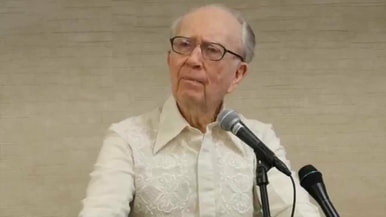Can Process Theology Affirm Creatio-Ex-Nihilo
and Divine Self-Limitation?
John B. Cobb, Jr.
January 22, 2019
|
Editor's Note: John B. Cobb, Jr., the world's leading process theologian, was asked this question by Muslim colleague in Norway, Farhan Shah. Shah publishes often in Open Horizons and specializes in the philosophy of Muhammad Iqbal. Professor Cobb's answer is "yes" and "yes." Process theologians can affirm creatio-ex-nihilo and divine self-limitation, if they wish. What makes a process theologian a "process theologian" is how he or she understands God's living relations with the world, quite apart from questions of what happened "before" creation and whether God possesses unused powers.
|
There is no question that some forms of process theology can affirm "creatio-ex-nihilo." Some do. On the other hand, clearly Whitehead did not. Further, this doctrine is often bound up with ideas about divine omnipotence that he expressly rejected, and this has led many of his followers to assume that he rejected creation out of nothing, too. But so far as I know, he never discussed whether or not there was an absolute beginning. Since we know God only in relation to the world, it is very difficult to envision God with no world to relate to. But since there would be no time whatever, before something other than God existed, "before" creation, and therefore before time, is not a very meaningful concept. Some people suppose that heaven preceded earth, and that creatio-ex-nihilo refers only to the physical reality. If one is free to take that position, then there are no metaphysical problems for Whiteheadians.
There may be good reasons for Muslims to use this language, such as Koranic texts that explicitly affirm creatio-ex-nihilo. In the Christian case, the scriptural account suggests that some kind of utter chaos is ordered by God; so one may say that creation is out of no things, but not the absolute nothing on which proponents of the doctrine often insist. However, those who feel bound by tradition to affirm absolute nothing may have good reasons. I wish them well and remain curious whether they know what they mean by this very mysterious idea.
My personal experience is that I cannot imagine a beginning of time. At the same time, I cannot imagine an infinite regression of temporal sequences either. Being unable to imagine either, and seeing no advantage in taking a position about something when I do not know what I can mean by what I say, I prefer to remain silent. Whitehead discusses only how each event arises out of the past. How an event would arise if there were no past, he does not say. Perhaps God would function as its entire past. But the idea of an infinite past is equally puzzling. I think this is one of many questions with which Whitehead did not concern himself.
The other question seems to be whether God could do things God never does, whether God has powers God never uses. Presumably no one has any evidence in favor of this view. Believing it raises the question, when evils rise to a certain pitch, why does God does not make an exception and exercise these powers? I personally find that adding beliefs for which there is no evidence and which raise questions about God's wisdom and love is theologically unwise. But, again, if that is required by religious authorities I see no reason to deny its possibility. Since it is not biblical, I urge fellow Christians to drop it and to focus attention on what God does do and to cooperate with that. If it is an explicit Koranic teaching, I can see that a Muslim may have to affirm it. And of course I know that those Christians who care more about tradition than about the Bible also feel obligated.
The strong preference of Whitehead and many of his followers not to burden ourselves with ideas about what God could do but does not do is certainly different from the position of others that it is important to make this addition. I do not see that this requires a significant parting of the ways. Unless something follows from the affirmation about unused abilities that is relevant to what happens and to our feelings about what happens, my preference would be to ignore our differences on this topic. Some of us say God can't do certain things because God cannot act against God's own decisions. Some of us say, God can't because God's nature is not so constituted. The only practical difference I see is that the former group has to justify God's failure to do what God could do. The latter group does not but has the problem of differentiating itself from much of the tradition. For the rest we can be in full agreement. If one wants to be a Whiteheadian and needs also to affirm that all that is except God had a beginning, I do not see that this excludes following Whitehead in all that he says about how events come to be. If one also needs to say that God has unused powers, but accepts Whitehead's understanding of how God in fact acts in the world, I do not see that that excludes one from the Whiteheadian family. Whiteheadians are free to believe many things that they receive from other sources than Whitehead. Whether that is wise or not can be discussed.
-- John B. Cobb, Jr.
Readers may also be interested in:
The author shows how we can retain valuable process insights, such as that God
is necessarily creative, social, loving, and embodied in some actual universe,
and still affirm ex nihilo for our universe.
is necessarily creative, social, loving, and embodied in some actual universe,
and still affirm ex nihilo for our universe.



